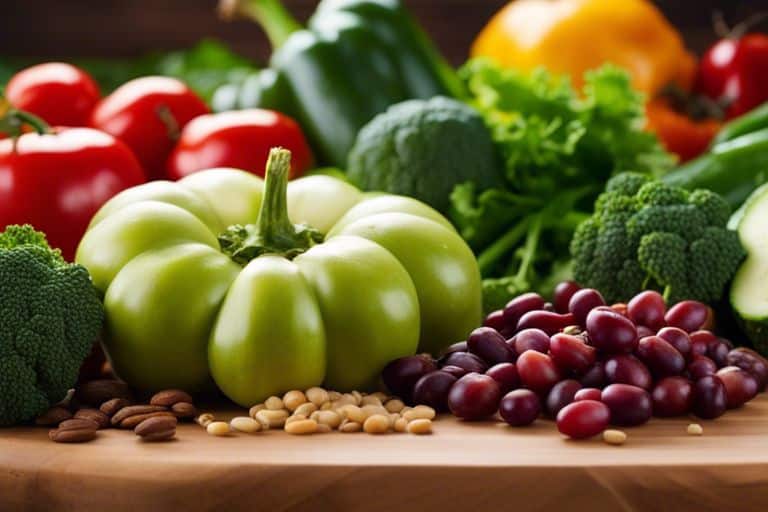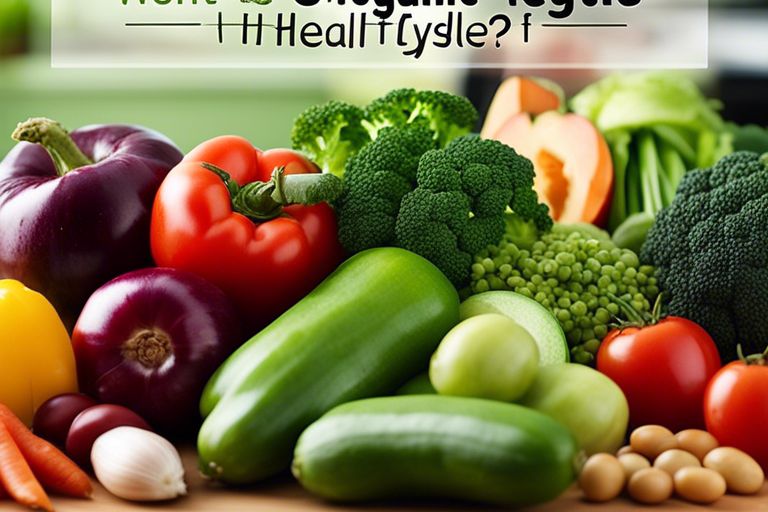Organic food is not just a trend but a significant step towards achieving optimal health and well-being. By choosing organic produce, you are not only nourishing your body with imperative nutrients but also protecting yourself from harmful chemicals and pesticides commonly found in conventional foods. The organic farming practices that emphasize soil health and biodiversity result in food that is not only better for you but also tastes richer and fresher. Let’s explore the reasons why organic food should be at the core of your healthy lifestyle.
Key Takeaways:
- Packed with Nutrients: Organic food is rich in necessary vitamins, minerals, and antioxidants that support overall health and well-being.
- Free from Harmful Chemicals: Organic farming practices prohibit the use of synthetic pesticides, herbicides, and genetically modified organisms, reducing exposure to potentially harmful chemicals.
- Environmental Sustainability: Choosing organic food promotes sustainable farming methods that are better for the environment, including soil health, water conservation, and biodiversity preservation.
The Nutritional Superiority of Organic Produce
Obviously, one of the key reasons why organic food is considered the ultimate fuel for a healthy lifestyle is its nutritional superiority compared to conventionally grown produce.
Vitamins and Mineral Content
An abundance of research has shown that organic fruits and vegetables contain higher levels of vitamins, minerals, and antioxidants compared to their non-organic counterparts. This is due to the fact that organic farming practices focus on promoting soil health, which in turn leads to nutrient-rich crops.
Organic produce has been found to have higher levels of important nutrients such as vitamin C, magnesium, and iron. These nutrients are crucial for maintaining a strong immune system, promoting healthy digestion, and supporting overall well-being.
Absence of Chemical Pesticides
For those concerned about the potential health risks associated with chemical pesticides, organic produce provides a safe and non-toxic alternative. Organic farming strictly prohibits the use of synthetic pesticides, herbicides, and fertilizers, which can leave residues on conventionally grown fruits and vegetables.
With organic produce, you can enjoy your fruits and vegetables without worrying about harmful chemicals lurking on the surface. This ensures that you are consuming food in its purest and most natural form, free from potentially harmful substances that may impact your health in the long run.
Organic Food and Disease Prevention
Reduced Risk of Chronic Diseases
To maintain optimal health, it is crucial to focus on preventing chronic diseases. Choosing organic food can significantly reduce the risk of developing conditions such as heart disease, diabetes, and certain types of cancer. Organic food is free from harmful pesticides and chemicals commonly found in non-organic produce, which have been linked to an increased risk of these diseases.
To ensure long-term health and well-being, incorporating organic fruits, vegetables, and grains into your diet can provide imperative nutrients and antioxidants that play a key role in disease prevention. By opting for organic options, you are not only supporting your own health but also promoting a sustainable and environmentally friendly approach to food production.
Supporting Immune System Health
Immune health is crucial for fighting off infections and diseases, and consuming organic food can play a significant role in supporting a strong immune system. Organic fruits and vegetables are rich in vitamins, minerals, and phytonutrients that help boost immune function and overall vitality.
Organic food is grown in nutrient-rich soil without synthetic pesticides or genetically modified organisms (GMOs), preserving the natural integrity of the produce. This means that the food retains its maximum nutrient content, providing your body with the tools it needs to maintain a robust immune system.
Reduced exposure to pesticides and other harmful substances found in non-organic foods can help reduce the burden on the immune system, allowing it to function more efficiently in responding to pathogens and keeping you healthy.
Environmental and Ethical Considerations
After exploring the nutritional benefits of organic food, it’s vital to explore into the environmental and ethical considerations that make organic food the ultimate fuel for a healthy lifestyle.
Sustainable Farming Practices
An integral aspect of organic farming is the emphasis on sustainable practices that promote soil health, biodiversity, and water conservation. Organic farmers avoid the use of synthetic pesticides and fertilizers, opting instead for natural and organic alternatives. This helps protect the soil from degradation and ensures long-term productivity without harming the environment or human health.
Furthermore, organic farming promotes crop rotation, cover cropping, and composting to maintain soil fertility and structure. By working with nature rather than against it, organic farmers contribute to the conservation of natural resources and the reduction of greenhouse gas emissions, making organic food production a more sustainable option for the planet.
Animal Welfare and Biodiversity
The welfare of animals and the preservation of biodiversity are also key factors in organic food production. Organic standards mandate that animals raised for organic meat, dairy, and eggs have access to the outdoors, natural sunlight, and a diet free from genetically modified organisms and synthetic additives. This not only ensures the well-being of the animals but also results in higher-quality products for consumers.
The promotion of biodiversity is another critical aspect of organic farming. By avoiding monocropping and supporting diverse habitats on organic farms, farmers help protect endangered species, promote pollinator populations, and maintain a healthy ecosystem. This interconnected approach to farming not only benefits the environment but also enhances the nutritional quality of organic fruits and vegetables.
Welfare of animals is a core principle in organic farming, ensuring that animals are treated humanely and with respect throughout their lives. By prioritizing animal welfare, organic farmers contribute to a more ethical and sustainable food system that values the well-being of all living beings involved in the production process.
Incorporating Organic Food into Your Diet
All health-conscious individuals understand the importance of incorporating organic food into their diet. By choosing organic produce and products, you are not only promoting your own well-being but also supporting sustainable farming practices that benefit the environment. Making the switch to organic food can seem daunting at first, but with proper planning and alignment with your values, it can become a seamless part of your healthy lifestyle.
Planning an Organic Diet
The first step in planning an organic diet is to take a look at your current eating habits and identify areas where you can make the switch to organic. Start by prioritizing organic items that are most important to you, such as fruits and vegetables known to have higher pesticide residues when conventionally grown. Consider creating a weekly meal plan that incorporates organic ingredients to ensure you have a variety of nutritious options readily available.
When transitioning to an organic diet, don’t feel pressured to overhaul your entire pantry all at once. Gradually replace non-organic items with their organic counterparts to make the process more manageable. Additionally, take advantage of local farmer’s markets or community-supported agriculture (CSA) programs to access fresh, organic produce grown in your region.
Overcoming the Challenges
Food budget concerns or limited availability may be perceived as challenges when it comes to incorporating organic food into your diet. However, it’s crucial to prioritize your health and well-being by investing in organic options whenever possible. Consider buying in bulk or joining a co-op to save money on organic products, and look for sales or discounts at health food stores to make organic food more affordable.
While the initial cost of organic food may be higher, the long-term benefits to your health and the environment are invaluable. Remember that every choice you make to support organic farming practices contributes to a healthier future for everyone. Stay informed about organic certification standards and don’t hesitate to ask questions about the sourcing of organic products to ensure you are making the best choices for your well-being.

Summing up
To wrap up, organic food is the ultimate fuel for a healthy lifestyle due to its significant benefits for both our well-being and the environment. By consuming organic fruits, vegetables, and grains, we reduce our exposure to harmful chemicals and pesticides, while also supporting sustainable agricultural practices. The higher nutrient content in organic food helps boost our immune system and overall health, making it a vital component of a balanced diet. Choosing organic is not only a smart choice for our personal health but also a conscious decision for the planet’s well-being. Embracing organic food is a key step towards achieving a healthier lifestyle for ourselves and the world we live in.
FAQ
Q: Why should I choose organic food for a healthy lifestyle?
A: Choosing organic food is imperative for a healthy lifestyle because it is free from harmful chemicals, pesticides, and genetically modified organisms. Organic food is grown in a way that is sustainable and environmentally friendly, promoting better health for both the consumer and the planet.
Q: How does organic food contribute to overall well-being?
A: Organic food is packed with higher levels of imperative nutrients such as vitamins, minerals, and antioxidants compared to conventionally grown produce. By consuming organic food, you are providing your body with the necessary fuel it needs to thrive, boosting your immunity, improving digestion, and increasing energy levels.
Q: What are the benefits of consuming organic food over processed food?
A: Organic food is a healthier choice over processed food because it is minimally processed and retains more of its natural nutrients and flavors. Processed foods are often loaded with unhealthy additives such as artificial colors, flavors, and preservatives, which can have negative effects on your health in the long run. Opting for organic food ensures that you are nourishing your body with wholesome ingredients that support a vibrant and healthy lifestyle.

